Shared vs Managed WordPress Hosting
Are you also faced with a critical decision: choosing between shared and managed WordPress hosting?
The foundation of your successful website lies in its hosting environment. And knowing which hosting to choose for your project plays a pivotal role.
At a glance, shared and managed hostings might seem to simply be different pathways to the same end -getting your website online.
However, the reality is more nuanced. Shared hosting, often hailed for its cost-effectiveness, offers a one-size-fits-all solution where multiple sites share server resources.
On the other hand, Managed WordPress hosting is tailor-made for WordPress websites, providing optimized performance, heightened security, and, often, dedicated resources.
But which is right for you?
Each type has its own set of advantages, limitations and ideal use cases.
We’ll reveal the core differences, delve into the pros and cons and equip you with the insights you need to determine the best fit for your website’s specific demands.
This post covers:
- What Is Shared Hosting?
- What Is Managed WordPress Hosting?
- The Main Differences Between Shared vs Managed WordPress Hosting
- Best Shared Hosting Providers
- Best Managed WordPress Hosting Providers
- Comparing Top 3 Picks for Shared WordPress Hosting
- Comparing Top 3 Picks for Managed WordPress Hosting
- Shared or Managed WordPress Hosting – Which One is Suitable For You?
- FAQs on WordPress Hosting
What Is Shared Hosting?
Hence the name, shared hosting is a type of WP hosting where multiple websites share the same server. Yup, this also means sharing resources like bandwidth, storage and processing power.
It’s like living in an apartment building where various residents share common facilities.
Due to its nature, it’s often a cost-effective choice for beginners or websites with low-to-moderate traffic. Shared hosting typically includes essential tools, cPanel access, and one-click WordPress installations.
Yet, this communal setting has its drawbacks.
Just as one resident hosting a loud party can disturb the entire building, a traffic surge or malfunction in one website might negatively affect the performance of others hosted on the same server.
Pros of Shared Hosting
- Affordability: In general, shared hosting is the most budge-friendly hosting option. The costs of maintaining the server are split among multiple users, keeping individual expenses low.
- Easy setup: Most shared hostings offer user-friendly control panels, such as cPanel and one-click WordPress installs, ensuring even complete beginners can set it up with ease.
- Maintenance and updates: Most of the maintenance and server updating is on the hosting provider, not the user, taking the technical load off website owners. (This was super handy for me when I launched my first website.)
- Scalability: When your website or blog starts to grow and needs more resources, switching to a higher-tier shared plan (or even a different hosting type) is usually very simple.
- Features: Many shared hosting plans come with handy tools and features, including website builders, free SSL certificates, email hosting and access to various software and scripts.
- Support: Most shared hosting services provide 24/7 customer support to assist with technical issues, which can be invaluable for those with limited technical knowledge.
- Multiple domains: If you look at mid and top-tier shared hosting packages, they usually allow users to host more than one domain on a single account. This can be beneficial for those managing multiple small websites.
Cons of Shared Hosting
- Limited resources: There’s a cap on how much CPU, RAM and storage your site can utilize because the resources are shared among multiple websites. (But this is mainly relevant during traffic spikes or when your website starts to grow (too rapidly)).
- Performance issues: If another site on the same server goes viral, experiences a traffic surge, or is poorly optimized, it can affect the server’s overall performance. This can potentially slow down your site.
- Security concerns: Sharing a server means you’re also sharing the risk. If one website becomes harmed, it could potentially threaten other sites on the same server, especially if the server isn’t configured correctly.
- Overcrowding: Some hosting providers might overload their servers with too many users, leading to regular performance issues and slower response times.
- Too general server configurations: The server settings are typically set up to cater to a general audience rather than being explicitly optimized for your exclusive needs. This can sometimes lead to compatibility or performance issues.
- Uptime issues: Even though many shared hosting providers guarantee a great uptime, unexpected downtimes are likely to occur due to the above reasons.
What Is Managed WordPress Hosting?
Managed WordPress hosting is a special environment tailored exclusively for WordPress websites, prioritizing performance, security and ease of use.
Unlike standard shared hosting, managed hosting handles the technical intricacies of maintaining a WordPress site, offering features such as automatic backups, updates and advanced security measures.
It’s meant for those who prefer a hands-off approach to the backend aspects of website management. It allows site owners to focus solely on content creation, design and growing their businesses.
The added benefits often come at a higher cost, but in return, users get an optimized, secure and often faster and more reliable WordPress experience.
Pros of Managed WordPress Hosting
- Performance: Managed WordPress hosts utilize server configurations specifically tuned for WordPress, ensuring faster load times and overall improved site speed.
- Automatic updates: The hosting provider often handles updates for WordPress core (sometimes even themes and plugins), ensuring that your website is always running the latest, most secure versions.
- Security: These hosts typically offer advanced security features, such as malware scanning, automatic SSL certificates, firewall configurations and DDoS protection.
- Staging environment: Many managed hosts provide staging sites, so you can test changes or new designs in a clone of your live site before making anything public.
- Caching: Advanced caching is often built-in or automatically handled, eliminating the need for 3rd-party plugins and ensuring optimal site speed.
- Maintenance: Besides updates, a managed WP host usually also handles database optimization and other backend tasks.
- Support: Customer support teams are WordPress-savvy experts, ensuring that any issues or questions you have about your WordPress site are addressed knowledgeably and efficiently (and quickly).
Cons of Managed WordPress Hosting
- Higher price: Managed WordPress hosting typically comes at a significantly higher price point than shared or even some VPS hosting options. It’s one of the reasons many decide to go with a shared solution.
- Lack of control: The environment is specifically tailored for WordPress, meaning you might have less control over server settings and software installations than a traditional hosting setup.
- Plugin restrictions: Some managed WordPress hosts may prohibit certain plugins they deem harmful or resource-intensive, limiting your flexibility in customizing your website. (They usually have a plugin blacklist on their website.)
- Platform limitations: A managed WP hosting is designed explicitly for WordPress. If you’re running or planning to run other CMS platforms alongside, managed WordPress hosting may not be suitable.
- Traffic limitations: Some plans come with monthly visitor caps. If your site exceeds these, you might encounter additional charges or need to upgrade to a more expensive plan.
- No domain registration: Some managed hosting providers may not offer domain registration services, requiring users to manage domains through a 3rd-party, potentially complicating the setup process.
- Multisite challenges: Not all managed hosts support multisite installs, or if they do, their entry-level plan doesn’t, so you need to upgrade right from the get-go.
The Main Differences Between Shared vs Managed WordPress Hosting
Here’s a quick breakdown of the main differences between shared and managed WordPress Hosting:
1. Service
- Shared hosting: Designed as a one-size-fits-all solution where multiple websites share the same server resources.
- Managed WordPress hosting: Tailored particularly for WordPress websites, offering specialized tools and optimizations.
2. Cost
- Shared hosting: More affordable as costs are divided among many users.
- Managed WordPress hosting: Often pricier due to WP-specific, tailor-made service.
3. Performance
- Shared hosting: Standard performance; a surge in traffic on one site can potentially affect others on the same server.
- Managed WordPress hosting: Optimized for WordPress, leading to faster load times and better responsiveness.
4. Security
- Shared hosting: Basic security measures with potential risks due to the shared server environment.
- Managed WordPress hosting: Advanced security features fitted for WP vulnerabilities, such as regular malware scans, firewalls and DDoS protection.
Have you seen our guide on how to improve WordPress website security?
5. Maintenance and updates
- Shared hosting: Updates might be the user’s responsibility, though some providers offer automatic updates for the core software.
- Managed WordPress hosting: Automatic updates for WordPress core (sometimes including themes and plugins). Regular backups and other maintenance tasks are also typically handled by the provider.
6. Support
- Shared hosting: Basic support that may not always be specialized in WordPress.
- Managed WordPress hosting: Dedicated, expert support familiar with WordPress-related issues.
7. Customizations and control
- Shared hosting: Often offers more freedom regarding server settings and installations.
- Managed WordPress hosting: Might have restrictions on some plugins or tools for optimal performance and security.
8. Usage
- Shared hosting: Very user-friendly with control panels like cPanel for website management.
- Managed WordPress hosting: Explicitly streamlined for WordPress, reducing the complexity of many technical aspects and offering a more hands-off experience for users.
Best Shared Hosting Providers
1. Hostinger
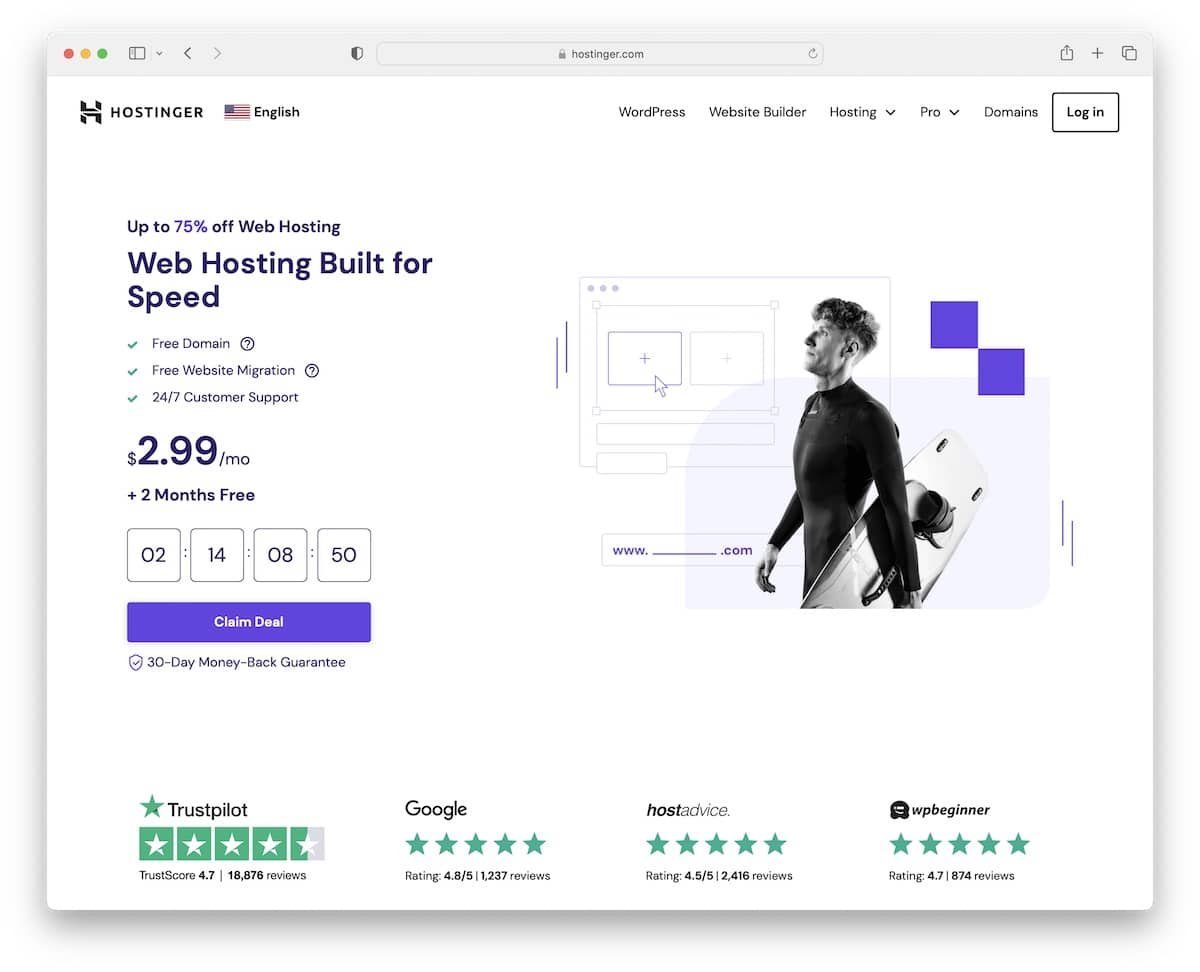
Hostinger prides itself on providing a web hosting experience with unmatched speed and optimal performance.
With a suite of advanced technologies such as full SSD servers, unlimited bandwidth, HTTP/3, IPv6 and LiteSpeed servers, they’ve positioned themselves as leaders in the shared hosting space.
Complementing their technological prowess, they also offer a free domain (except the entry-level plan), seamless website migration at no extra cost and 24/7 customer support from a dedicated success team, ensuring that even novices can effortlessly host their websites.
Their commitment extends beyond just performance; security is paramount. Every hosting package has unlimited free SSL certificates, DDoS protection, auto-updates and an in-house developed WAF, especially with their Premium and Business hosting solutions.
And when it comes to building websites, Hostinger offers a drag-and-drop page builder with a fantastic AI tool and 150 predesigned templates. But feel free to learn how to build a WordPress website through our step-by-step tutorial.
Hostinger ensures its users maintain full control over their hosting with features like SSH, WP-CLI, PHP version control, Git integration, and more.
They further eliminate any geographical constraints by offering global data centers spanning Europe (check European WordPress hosting solutions for more alternatives), Asia and North and South America.
Specifically optimized for WordPress, Hostinger simplifies the management of WordPress sites, offering one-click installation, auto-updates and WP staging tool.
Features:
- Global data centers
- 27/7 live support
- Free migration
- LiteSpeed servers for speed
- Free SSL certificate
- Fantastic control over hosting’s settings
- 50+ GB storage
- 99.9% uptime guarantee
- 2+ subdomains per account
- Malware scanner
Price:
- Single ($1.99/mo): One website, standard performance, 50 GB SSD storage
- Premium ($2.99/mo): 100 websites, standard performance, 100 GB SSD storage
- Business ($3.99/mo): 100 websites, increased performance, 200 GB NVMe storage
- Cloud Startup ($9.99/mo): 300 websites, increased performance, 200 GB NVMe storage
Why we recommend it: We recommend Hostinger to both novice and seasoned website owners, seeking a reliable and great-performing hosting solution without breaking the bank.
Get Hostinger2. Bluehost
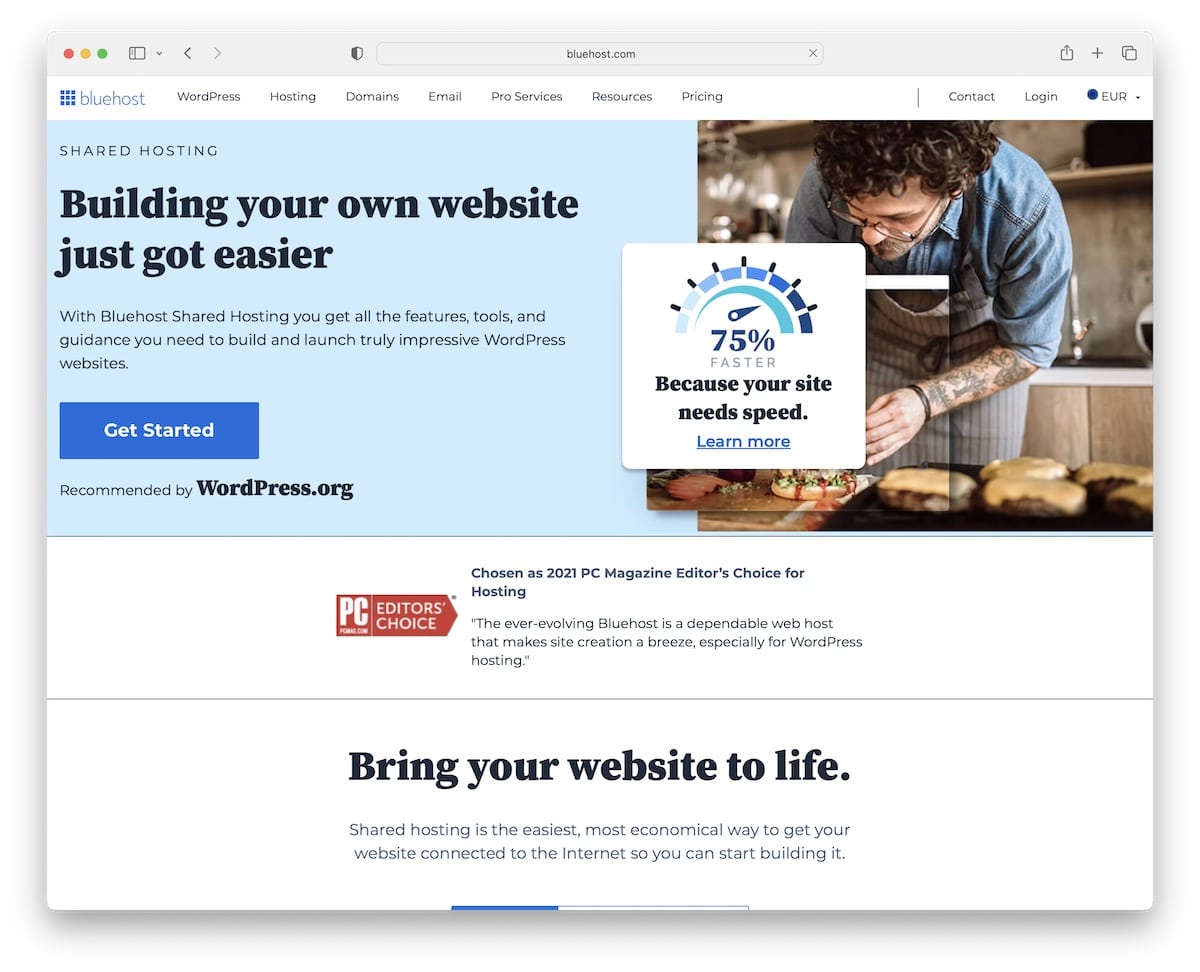
Let’s first mention that Bluehost is one of the few hosting providers recommended by WordPress itself (since 2005).
Bluehost’s Shared Hosting is renowned for its comprehensive bundle of tools, features and guidance tailored specifically for WordPress users, simplifying the website creation process.
One particularly awesome feature is their Wonder tool that streamlines site setup and customization, providing a user-centric dashboard that integrates effortlessly with WordPress.
Each WordPress hosting plan incorporates Wonder and boasts features like automatic WordPress installation, resource protection, ensuring undeterred site performance even on shared servers, and an SSL certificate for secure data encryption. Regarding security, you also benefit from automatic malware scans through their SiteLock Security Scans solution.
Bluehost integrates Cloudflare CDN (find more CDN services for WordPress here), caching technology, and SSDs, which synergistically optimize load times and overall site efficiency.
Moreover, Bluehost also offers its customers 24/7 assistance via phone and chat, even extending to specialized website design services for those in need.
Features:
- Automatic WordPress installs
- Quick and easy onboarding
- Free SSL certificate
- Automatic malware scans
- 10+ GB SSD storage
- Custom WordPress themes
- 24/7 phone and chat support
- Server-level caching
- 1-5 websites
- Free CDN
Price:
- Basic ($3.90/mo): One website, 10 GB SSD storage, no free CDN, no free domain
- Choice Plus($7.21/mo): Three websites, 40 GB SSD storage, free CDN, free domain
- Choice Store ($13.16/mo): Three websites, 40 GB SSD storage, free CDN, free domain
- Pro ($18.45/mo): Five websites, 100 GB SSD storage, free CDN, free domain
Why we recommend it: We recommend Bluehost to individuals, bloggers and small business owners looking for a robust and easy-to-use shared hosting.
Get Bluehost3. Siteground

SiteGround’s shared hosting is optimal for those wanting to elevate their online presence, backed by outstanding security, fast speed and around-the-clock support.
With SiteGround, users can quickly build and launch websites using their preferred site builder and enjoy a seamless transition with their free migration tools.
Moreover, the platform is tailored for various PHP-MySQL-based CMS and CRM applications, ensuring versatility and efficiency.
For users seeking more advanced features, SiteGround’s GrowBig and GoGeek plans offer the ability to host multiple sites under one account, achieve faster site speeds with their custom PHP setup, and use the easy staging tool for hassle-free site modifications.
Those on the GoGeek plan benefit from advanced priority support, streamlined development with Git integration, and the unique option to provide white-label client access to their site’s tools.
If you’re also searching for white labeling tool, we have a list of the best white label website builders that will get you going in no time.
From domain management to reliable email services, unmetered traffic and CDN, SiteGround ensures a comprehensive hosting experience tailored for scalability and performance.
Features:
- Free CDN
- Free SSL
- Daily backups
- Managed WordPress
- Integrated caching
- 30-days money-back guarantee
- Supports eCommerce
- Unlimited databases
- Effortless site and email transfers
- Compatible with various PHP-MySQL-based CMS and CRM apps
Price:
- StartUp ($2.99/mo): One website, 10 GB storage, 10,000 visits/month, free SSL
- GrowBig ($4.99/mo): Unlimited websites, 20 GB storage, 100,000 visits/month, free SSL
- GoGeek ($7.99/mo): Unlimited websites, 40 GB storage, 400,000 visits/month, free SSL
Why we recommend it: We recommend SiteGround for all kinds of sites, from blogs and business sites to online stores, including medium-to-high trafficked ones.
Get SitegroundBest Managed WordPress Hosting Providers
1. WP Engine
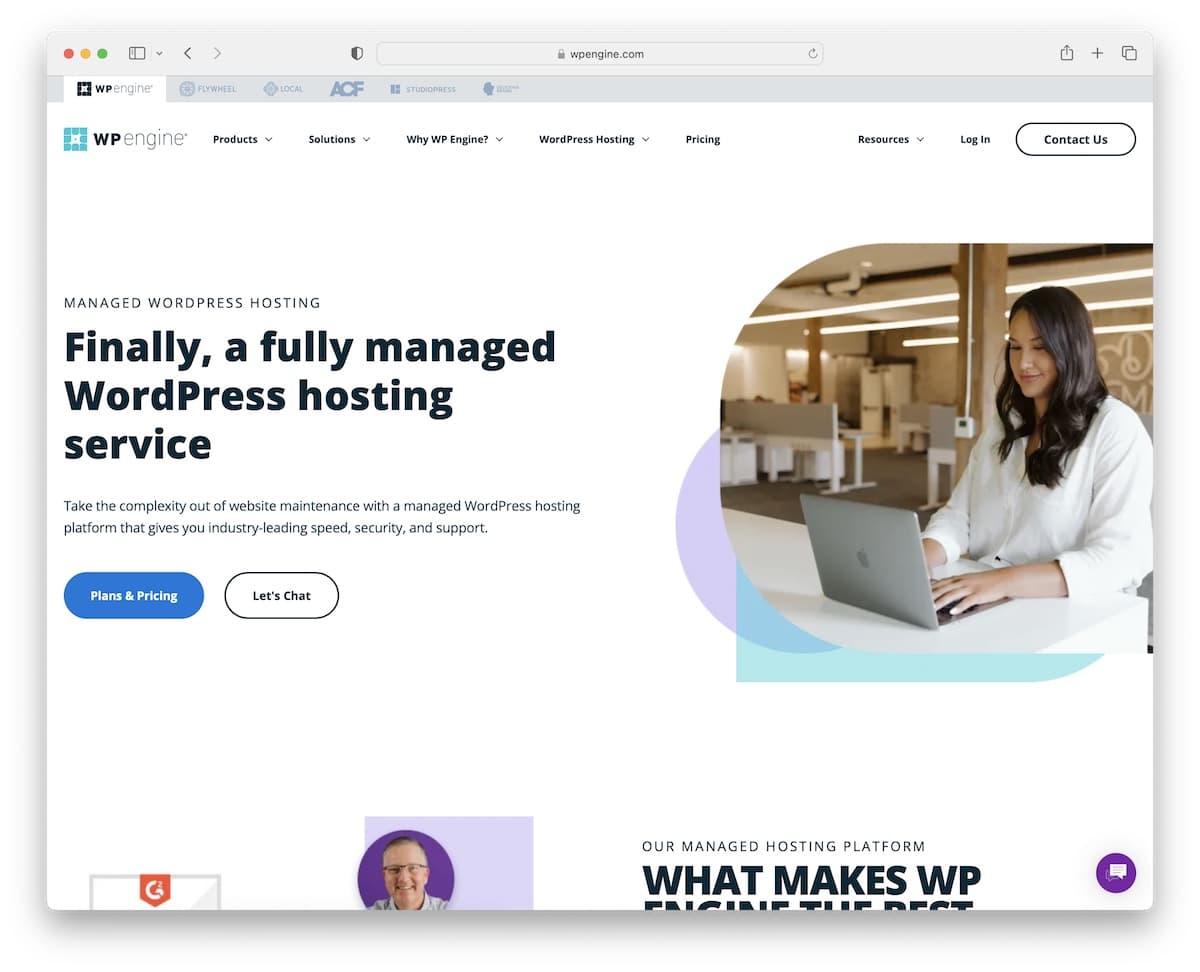
WP Engine stands as a pinnacle in managed WordPress hosting, ensuring that users experience the zenith of speed, security, and support.
With their service, you’re essentially hiring a dedicated technical aide to supercharge your website. This encompasses elements like active threat detection, daily backups, timely WordPress updates, and caching mechanisms that notably enhance page speeds.
Moreover, WP Engine arms its users with an arsenal of premium tools to effortlessly design, build, and deploy websites, complemented by round-the-clock live support.
Highlighting the extensive advantages of WP Engine’s managed hosting, over a million websites benefit from automated updates, daily backups, seamless one-click staging and a bundle of premium themes.
They emphasize rigorous security measures that block an astounding 26 billion+ cyber attacks annually, bolstered by complimentary SSL and native platform protection.
Performance is paramount; hence, WP Engine ensures optimal page speed, which is crucial for visitor satisfaction and search engine optimization. (Yup, Google loves fast websites and tends to rank them higher.)
Furthermore, for those seeking a robust eCommerce solution, WP Engine’s seamless integration with WooCommerce and its features, like Instant Store Search by ElasticPress, redefine the online shopping experience. (But if you’re exclusively searching for eCommerce hosting, then look at these top WooCommerce hosting providers.)
If you want to learn more about this host, take a peek at our WP Engine review.
Features:
- EverCache for speed boosting
- Threat blocking
- Advanced CDN
- Free SSL and SSH certificates
- Activity log and user permissions
- Daily backups
- Free automatic migration plugin
- Customizable WordPress themes
- One-click staging
- Local developer tools
Price:
- WordPress Hosting ($20/mo): One site, 10 GB storage, 25,000 visits/month, 50 GB bandwidth
- WooCommerce Hosting ($50/mo): Three sites, 15 GB storage, 75,000 visits/month, 125 GB bandwidth
- Advanced Solutions ($600/mo): Custom solution for specific needs
Why we recommend it: We recommend WP Engine to all bloggers and entrepreneurs (small and big websites), looking for a high-performance, secure and fully managed hosting experience. Stop wasting time on maintenance; keep focusing on growing your business.
Get WP Engine2. Kinsta
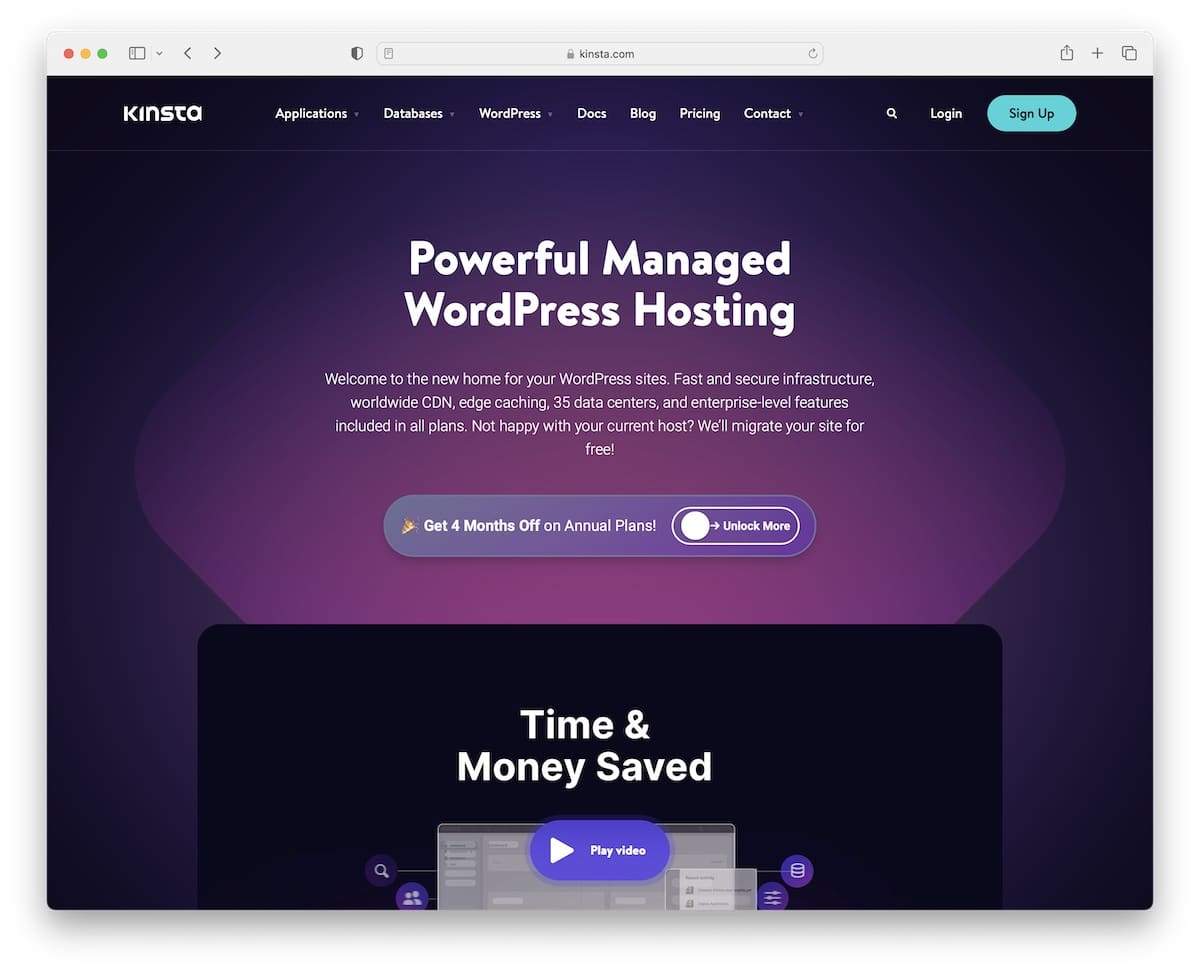
Before we continue, Kinsta is the hosting that Colorlib uses.
Kinsta provides a high-performance managed WordPress hosting solution powered by Google’s top-tier infrastructure.
With 35 data centers globally, Kinsta guarantees speedy website performance, boasting up to a 200% speed increase for clients migrating to their platform.
Key performance features include hosting on Google’s high-end CPUs, a vast CDN network spanning 260+ locations, and Edge Caching, which has demonstrated reductions in load times by up to 49%.
Also, Kinsta doesn’t take security lightly. It is a top priority, with provisions such as enterprise-level DDoS protection, wildcard SSL support and a commitment to tackle any malware threats for free. (We find their security superb; it already helped us avoid multiple inconveniences.)
Their user-friendly MyKinsta dashboard is the centralized platform where users can manage their WordPress sites and databases.
It offers tools for site management, analytics, optimization, and previews for migrated sites.
For developers, Kinsta provides a suite of advanced tools, including DevKinsta for local WordPress development and a range of PHP version supports. The platform also includes features like staging environments, easy PHP switching, and a search and replace tool.
Kinsta offers round-the-clock support from expert technicians (they’re the best!) to bolster client confidence and has a stellar 97% satisfaction rate across its broad array of services.
Finally, our in-depth Kinsta review proves why it’s such a powerful hosting even further.
Features:
- Edge caching
- Application Performance Monitoring
- 35 data centers
- Free SSL
- Site backups and uptime checks
- Site management tools
- Analytics
- Optimization tools
- One-click WP site creation
- Kinsta API
Price:
- Starter ($24/mo): One WP install, 10 GB storage, 100 GB CDN, 25,000 visits/month
- Pro ($47/mo): Two WP installs, 20 GB storage, 200 GB CDN, 50,000 visits/month
- Business 1 ($77/mo): Five WP installs, 30 GB storage, 400 GB CDN, 100,000 visits/month
- Business 2 ($150/mo): Ten WP installs, 40 GB storage, 600 GB CDN, 250,000 visits/month
- Business 3 ($227/mo): Twenty WP installs, 50 GB storage, 800 GB CDN, 400,000 visits/month
- Business 4 ($300/mo): Forty WP installs, 60 GB storage, 1,200 GB CDN, 600,000 visits/month
- Enterprise 1 ($450/mo): Sixty WP installs, 100 GB storage, 2,000 GB CDN, 1 million visits/month
- Enterprise 2 ($667/mo): Eighty WP installs, 150 GB storage, 3,000 GB CDN, 1.5 million visits/month
- Enterprise 3 ($900/mo): 120 WP installs, 200 GB storage, 4,000 GB CDN, 2 millions visits/month
- Enterprise 4 ($1,100/mo): 150 WP installs, 250 G storage, 6,000 GB CDN, 2.5 million visits/month
Why we recommend it: We recommend Kinsta to businesses and developers seeking a robust and high-performance managed WordPress hosting solution, especially those prioritizing speed, security and user-friendly management tools.
Get Kinsta3. Pressable
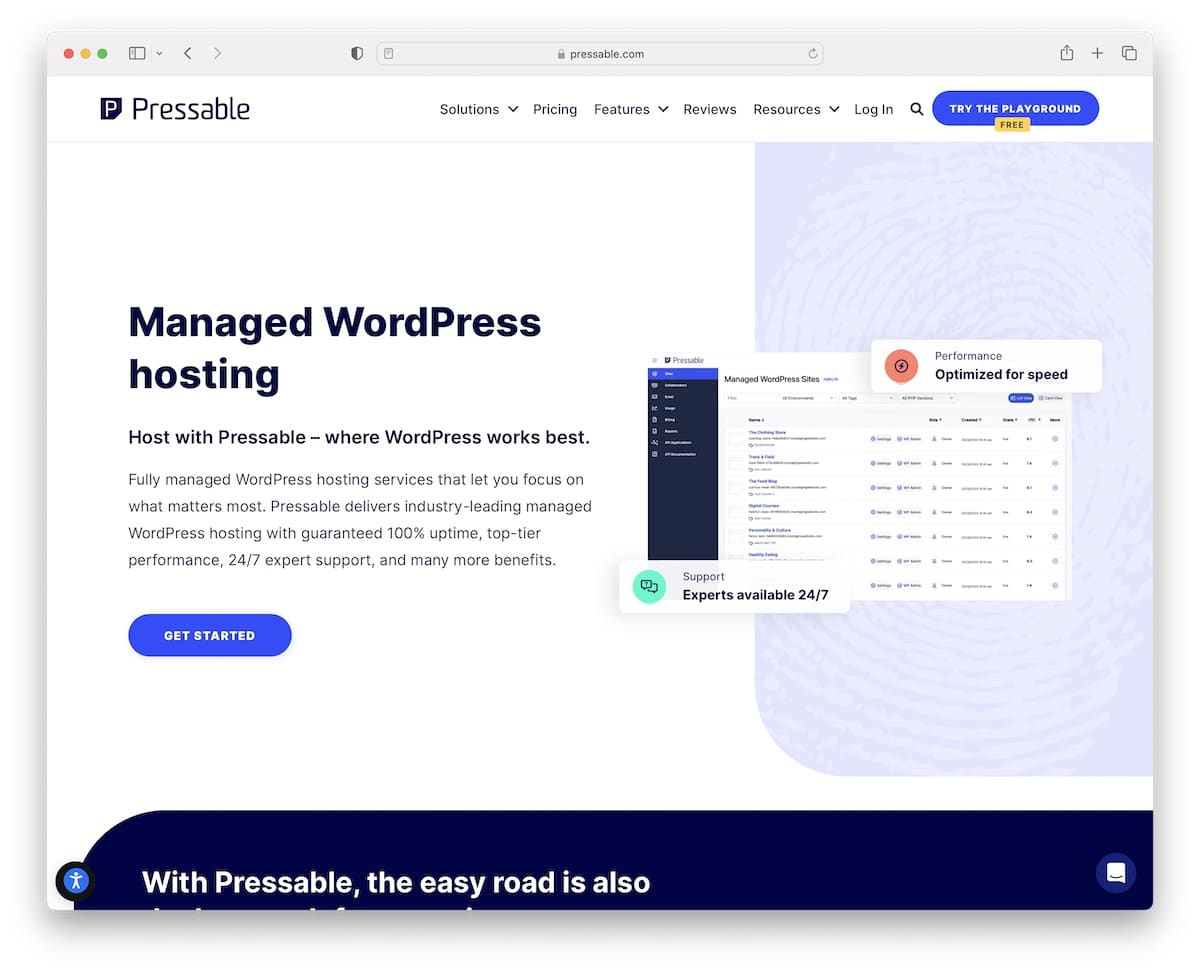
Pressable delivers superb managed WordPress hosting services that are fully managed, with a 100% uptime guarantee, superior performance and excellent expert support.
Hosting with Pressable means leveraging Automattic’s WP Cloud, an exclusive cloud platform optimized for WordPress in terms of speed, uptime, security, and scalability, ensuring an affiliation with the very creators of WordPress.
With Pressable, users benefit from a vast network of 28+ data centers spread over six continents, ensuring optimal site performance even during traffic surges. Furthermore, the platform’s architecture replicates sites in real-time to another data center for additional reliability.
Pressable fights against cyber threats with modern technology, including DDoS and WAF protection, and also includes free Jetpack Security Daily for automated backups.
The hosting service also facilitates seamless site migrations, either through an automated plugin or by the Pressable team.
Site management is made simple through an intuitive dashboard, and the platform offers access to numerous plugins, themes, and advanced developer tools like SSH, WP-CLI, and GIT.
Pressable’s holistic approach to managed WordPress hosting ensures businesses can focus on growth while it handles the technicalities, making it a suitable choice for a wide range of business types and offering customized plans if needed.
Features:
- WordPress cloud platform
- 100% uptime guarantee
- Free automatic failover
- Free CDN
- Performance monitoring and optimization
- Free SSL
- Free daily backups
- User-friendly dashboard
- Free managed migrations
- Customizable and scalable resources
Price:
- Entry ($19/mo): One website, 10 GB storage, 5,000 visits/month
- Personal ($25/mo): One website, 20 GB storage, 30,000 visits/month
- Starter ($45/mo): Three websites, 30 GB storage, 50,000 visits/month
- Advanced ($60/mo): Five websites, 35 GB storage, 75,000 visits/month
- Pro ($90/mo): Ten websites, 50 GB storage, 150,000 visits/month
- Premium ($155/mo): Twenty websites, 80 GB storage, 400,000 visits/month
- Business ($350/mo): Fifty websites, 200 GB storage, 1 million visits/month
- Business 80 ($545/mo): Eighty websites, 275 GB storage, 1.6 million visits/month
- Business 100 ($675/mo): 100 websites, 325 GB storage, 2 million visits/month
Why we recommend it: We recommend Pressable to individuals and businesses searching for WordPress-exclusive managed hosting. Its association with Automatic’s WP Cloud (people behind WordPress) makes it ideal if you want to take things to the next level.
Get PressableComparing Top 3 Picks for Shared WordPress Hosting
| Hostinger | Bluehost | SiteGround | |
|---|---|---|---|
| Pricing | $1.99+/mo | $3.90+/mo | $2.99+/mo |
| Websites | 1+ | 1+ | 1+ |
| Free SSL | Yes | Yes (except Basic plan) | Yes |
| Storage | 50 GB+ | 10 GB+ | 10 GB+ |
| Bandwidth | Unlimited | Unlimited | Unlimited |
| CDN | Yes (only Business & Cloud Sartup plans) | Yes (except Basic plan) | Yes |
| eCommerce | Yes (only Business & Cloud Sartup plans) | Yes (only Online Store plan) | Yes |
| Money-back guarantee | Yes, 30 days | Yes, 30 days | Yes, 30 days |
| Caching | Yes (only Business & Cloud Sartup plans) | Yes | Yes |
| Support | 24/7 | 24/7 | 24/7 |
Comparing Top 3 Picks for Managed WordPress Hosting
| WP Engine | Kinsta | Pressable | |
|---|---|---|---|
| Pricing | $20+/mo | $24+/mo | $19+/mo |
| Websites | 1+ | 1+ | 1+ |
| Free SSL | Yes | Yes | Yes |
| Storage | 10 GB+ | 10 GB+ | 10 GB+ |
| Bandwidth | 50 GB+ | Unlimited | Unlimited |
| CDN | Yes | Yes | Yes |
| eCommerce | Yes (WooCommerce hosting plan) | Yes (Business 1 plan and above) | Yes (Personal plan and above) |
| Money-back guarantee | Yes, 60 days | Yes, 30 days | Yes, 30 days |
| Caching | Yes | Yes | Yes |
| Support | 24/7 | 24/7 | 24/7 |
Shared or Managed WordPress Hosting – Which One is Suitable For You?
When deciding between shared and managed WordPress hosting, consider your needs, budget and expertise.
Shared hosting is cost-effective and offers more hands-on control, suitable for beginners or small personal blogs and websites.
On the contrary, managed WordPress hosting, though pricier, provides a tailored environment for WP with premium services like enhanced security, optimized and reliable performance and expert (priority) support, making it ideal for bloggers and businesses wanting a hassle-free experience without needing to manage the technical aspects of your site.
Here are our two best recommendations that are versatile enough for every need:
- Hostinger is an fantastic shared hosting solution for beginners and experts who need a reliable and great-performing hosting on a budget.
- WP Engine is a top managed WordPress hosting choice due to its high performance, great security and overall fantastic experience.
In conclusion, the choice between shared and managed WordPress hosting depends on your budget, technical proficiency, and what you need from your hosting environment.
Always evaluate your site’s needs and growth projections before making a final decision.
FAQs on WordPress Hosting
What is the main difference between shared and managed WordPress hosting?
Shared hosting involves multiple websites sharing the resources of a single server, making it more affordable but potentially affecting performance and security. In contrast, managed WordPress hosting offers a tailored environment specifically for WP sites, providing optimized performance, advanced security features and hands-on technical management. While shared hosting is budget-friendly and general-purpose, managed hosting ensures a higher-quality, specialized experience for WordPress users, but (often) at a higher cost.
Can I switch between shared and managed hosting?
Yes, you can switch between shared and managed hosting. The process involves migrating your website’s data, files and databases from one hosting environment to another. Luckily, many hosting providers offer migration services to assist with this transition, ensuring minimal downtime and a smooth experience.
Is managed hosting always better than shared hosting?
Managed hosting isn’t universally better than shared hosting; it depends on individual project needs and circumstances. While managed hosting provides optimized performance, enhanced security and dedicated WordPress services, it often comes at a higher cost. Shared hosting might be more suitable for smaller websites or those on a tighter budget despite potential limitations in performance and security.
What are some real-world examples of sites using shared and managed hosting?
Example websites using shared hosting: World Food Travel Association, The Greats, Sebastien Bicard and Maua Gang.
Example websites using managed WordPress hosting: Colorlib, Pleaz, Harvest, iFLY and Neuralab.
How do I choose the best hosting type for my WordPress site?
To choose the best hosting type for your WordPress site, first assess your site’s expected traffic volume, performance needs and your technical expertise. Consider your budget and weigh the importance of features like specialized support, enhanced security and scalability. Shared hosting is best for simpler and smaller sites, while managed is best for more advanced and traffic-heavy ones.



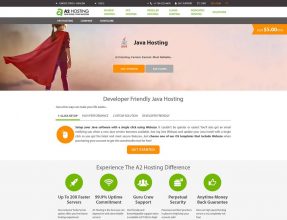



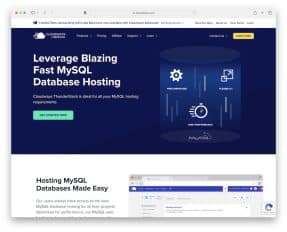
This Post Has 0 Comments